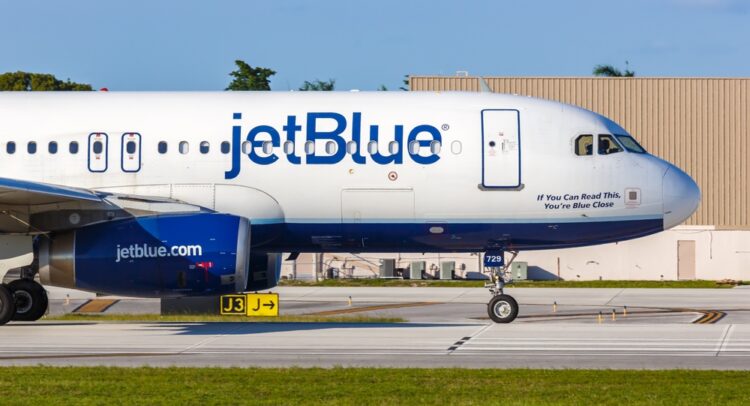JetBlue Airways (JBLU) stock crashed about 21% on August 12, following news of debt issuance and credit downgrades. The American air carrier announced that it is raising roughly $3.15 billion in additional debt through various programs to boost its liquidity. The news was received unfavorably by the Big Three credit rating agencies, leading to a downgrade of the carrier’s credit rating.
JetBlue is among the ten largest passenger carriers in the U.S. The company is facing multiple challenges, including increased costs, competition in key routes, pending deliveries of 44 new Airbus (FR:AIR) jets hampering capacity expansion, and massive capital expenditures. JetBlue also faced an issue with contaminated powder metal from the Geared Turbofan (GTF) engines manufactured by Pratt & Whitney’s, which compelled the company to station several jets.
Here’s How JetBlue is Raising Capital
JetBlue announced a private placement of $1.5 billion of senior secured notes due 2031. Plus, it proposed a senior secured Term Loan B of $1.25 billion due 2029. Both these loans will be primarily secured by JetBlue’s customer loyalty program, TrueBlue. Airlines often prefer this approach of using their loyalty programs as collateral to secure debt.
Furthermore, JetBlue announced a $400 million convertible senior notes offering, due 2029. The amount from this offering would be utilized to repurchase (refinance) a part of its existing 0.50% senior convertible notes due 2026. The remaining amount, if any, from the notes offering and the aforementioned loans will be used for general corporate purposes.
JetBlue Loses Credit Worthiness
Following the capital raise news, the Big Three credit rating agencies revisited their view on JetBlue’s financial health. S&P Global Ratings downgraded JetBlue’s issuer credit rating from “B” to “B-,” stating that its operating challenges would continue for the next one or two years. S&P Global expects JBLU’s funds from operations to debt ratio to be in the low single digits until at least 2025, and negative net cash flows from business operations.
At the same time, Moody’s lowered JetBlue’s corporate family rating to “B3” from “B2,” saying that it could take the carrier years to return to normalized operating profit and cash flow levels. Moody’s projects that JBLU could burn $2.2 billion and $1.4 billion in cash in 2024 and 2025, respectively.
Meanwhile, Fitch Ratings maintained JetBlue’s long-term issuer default rating of “B,” citing manageable short-term debt maturities and “healthy” liquidity. Even so, it put the firm on watch, stating that it could face downgrades in the event of continued deterioration in profitability and cash flows. Nonetheless, Fitch downgraded JBLU’s existing senior secured debt ratings from “BB” to “BB-,” citing margin pressures at least through 2025.
Is JBLU a Good Stock to Buy?
Considering the existing challenges, debt issuance, and credit rating downgrades, analysts consider investing in JBLU stock a bit risky. On TipRanks, JBLU has a Hold consensus rating based on one Buy, three Holds, and two Sell ratings. The average JetBlue Airways price target of $6.70 implies 39.6% upside potential from current levels Shares have declined 13.5% year-to-date.

















